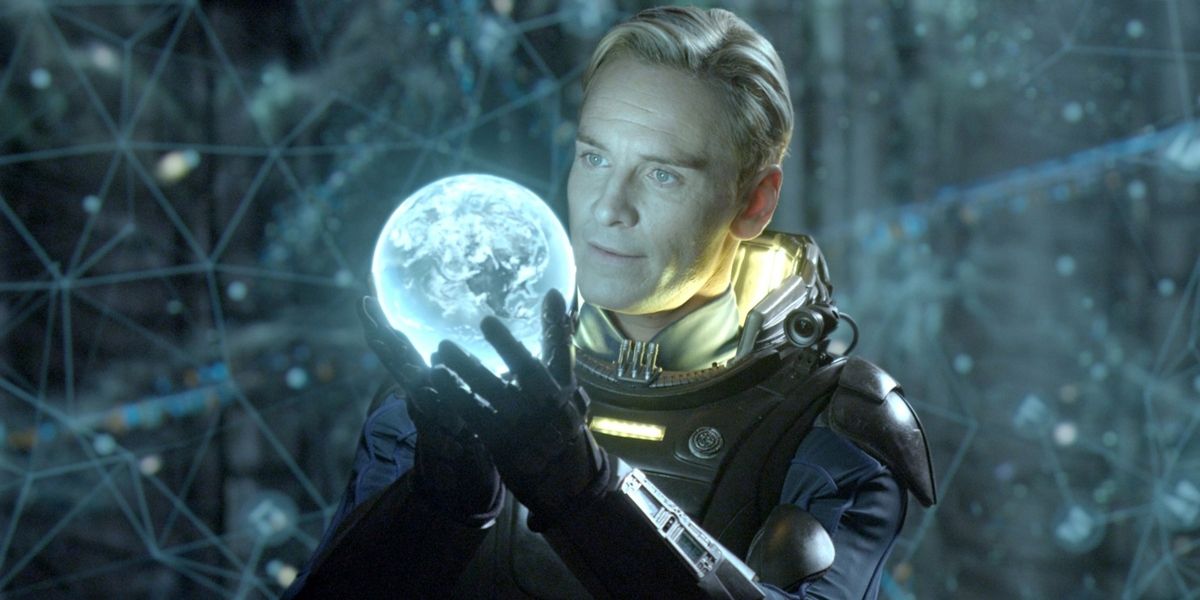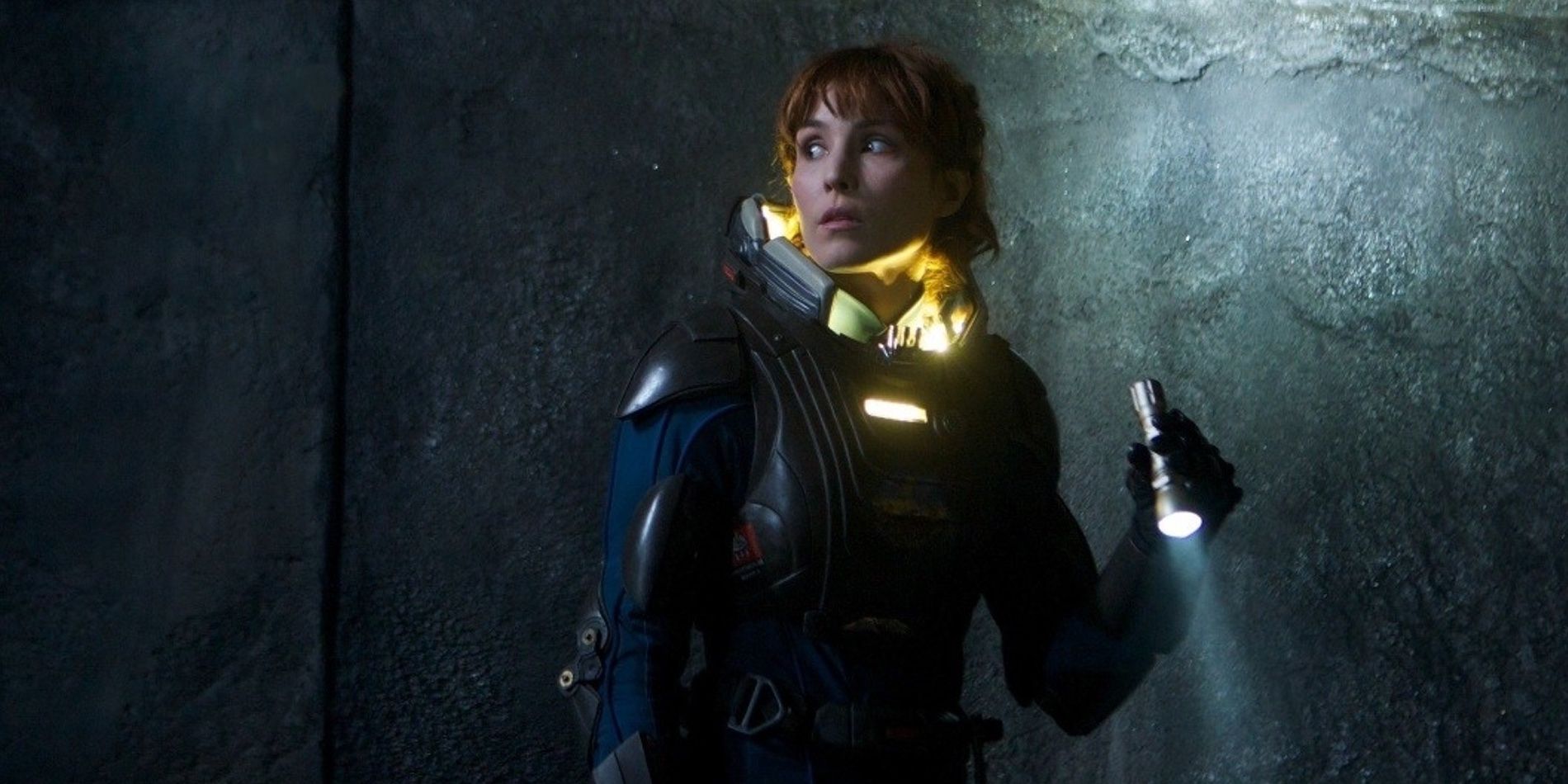In June 2012, the Alien franchise made its long-awaited return to movie theaters as a solo film series (no Predators to be found here) in the form of Prometheus. A prequel that largely functioned as a standalone story, Prometheus ended up scoring divisive reviews from moviegoers. The discourse surrounding the film eventually largely focused on scientists taking off helmets on alien planets prematurely and other “plot holes” than anything else. That’s a tragedy, since Prometheus, while far from devoid of problems, deserves more than getting buried in “dings” from CinemaSins.
Part of what makes it even easier to appreciate Prometheus a decade after its release is the way it compares to the default blockbuster mold that has emerged since 2012. Modern blockbusters are largely commenting on themselves and the public’s perception of the franchise they occupy. These self-reflexive tendencies have resulted in highly enjoyable blockbusters like Spider-Man: No Way Home and Top Gun: Maverick. However, this shift in focus does mean there’s been a dearth of massively expensive blockbusters grappling with larger philosophical and theological inquiries.
Nobody will ever mistake Prometheus for something as hefty or contemplative as the works of Carl Theodore Dreyer or Yasujiro Ozu. However, hinging the plot on a deeply Christian woman, Dr. Elizabeth Shaw (Noomi Rapace), coming to terms with the idea that her saviors are actually violent oppressors is an intriguing one that informs a palpably tragic undercurrent to the entire story. Her hopeful outlook is an anomaly in this universe. It’s a perspective that’s often dwarfed and overwhelmed by the powers of the non-human characters around her. Such characters include the Android David (Michael Fassbender), a creation of humanity, who ends up turning his back on and betraying the organisms that birthed him.
In the storyline of Prometheus, human beings are caught between constantly malevolent forces in the form of both their creators and those that they’ve created. The consequences of that position are often grave. Save for a trio of pilots in the finale (led by Idris Elba), humans suffering at the hands of these forces don’t even get to die in a spectacular self-sacrificing fashion. Instead, humans often just perish in comically abrupt and disappointing ways, like baddie Meredith Vickers (Charlize Theron) getting crushed by an enormous spaceship. In looking for clarity from discovering their creators, Shaw and the other Earthlings of Prometheus just reinforce the minuscule and often disposable nature of humanity in the scale of the cosmos.
This bleak view of this species is even reflected in how the selfish actions of humans like Peter Weyland (Guy Pearce) often spur on the most gruesome parts of the story. This is a tale about the follies of humanity, searching for answers where they shouldn’t and seemingly doomed to die at the hands of greater organisms. The screenplay could stand to interrogate those ideas more and not have them get largely lost whenever it’s time for extra-terrestrials to start chasing people down silver hallways. However, the presence and often interesting use of these concepts does lend Prometheus more heft, especially when compared to other blockbusters that have emerged in the last decade. Rather than just making references to how the world has seen the Alien franchise, Prometheus uses its theological musings to convey a nihilistic view of humanity.
Prometheus also deserves more kudos for its visuals, which can often prove even more engaging than its screenwriting. Told largely with a mixture of practical sets and location shooting in Iceland, Prometheus makes alien worlds feel instantly tactile. Director Ridley Scott is in fine form capturing the grand scale of these vistas as well as showing tonal variety in his filmmaking. Initially, he’s able to make the home planet of these creators seem like a Heavenly paradise, while he lends equal levels of believability to later sequences where the same planet needs to be perceived as an inescapable Hell. At either extreme, Scott and the backdrops of Prometheus are there to immerse the audience in every striking atmosphere the story swerves into.
The tangibility of the visuals even extends to the nifty spacesuits, which also include helmets that offer wearers 360-degree vision. As a welcome surprise, this attire isn’t just a carbon copy of costumes seen in previous Alien movies. Instead, the colors and specific details (like those helmets) are specific and unique to Prometheus. While many visual elements of this feature do take cues from earlier Alien installments, the costumes and most striking images of Prometheus show how well the film can add to the visual language of this franchise rather than just mimic it.
Prometheus also proves entertaining in its performances, which may have alienated certain audiences in their enjoyably outsized manner. Anchoring the whole thing is Noomi Rapace, whose big sincerity-caked eyes convey how much this mission means to her. It’s a detail that takes on a deeply ironic context once everything becomes a relentless nightmare. The supporting players are similarly distinctive.
Idris Elba, for instance, shows up as a pilot harnessing a Southern accent that often makes him sound like the Hyperspace Chicken Lawyer from Futurama. Charlize Theron, meanwhile, is a rigid figure emanating hostile stern energy, she always looks like she’s ten seconds away from snapping the spine of anyone who doesn’t catch her fancy. And, of course, there’s Michael Fassbender as android David, with the acclaimed performer delivering a subtle performance that always keeps you guessing where this robot’s true allegiances lie.
Not every performance here works or becomes immediately iconic. Logan Marshall-Green, for instance, fades into the background as Shaw’s boyfriend and years of highly entertaining Marvel Cinematic Universal appearances make one wish Benedict Wong had more to do in a tiny role. However, the discernible acting choices made by talented performers in Prometheus are, by and large, a hoot. They’re an especially welcome presence in a movie that’s often dark and meditative. Who says grim blockbusters can’t contain performances rife with personality?
Prometheus’s worthiness of reappraisal is even reflected by the quality of its successor. The 2017 film Alien: Covenant attempted to merge the thoughtful aspects of Prometheus with a traditional Alien movie, complete with a lot of Xenomorph mayhem. Covenant had its fun moments, like the sight of two Michael Fassbender’s smooching. However, the film was largely a disjointed mess that couldn’t work as either grisly entertainment or weighty cinema. The consistently underwhelming sight of a CGI Xenomorph scurrying around in broad daylight just felt like the only thing the film was committed to was giving fanboys what they theoretically want. It was a direction that made one yearn for a return to the flawed but confidently distinctive vibes of Prometheus.
Prometheus is not a flawless masterpiece. It still adheres too closely to the storytelling and visual expectations of the original Alien, while it eventually loses its weightier narrative instincts in the pursuit of lengthy chase scenes. But it’s also such a compelling movie, complete with an unshakable ominous aura and several commendably bold performances. Even better, it largely doesn’t feel like it wants to fulfill what fans want, rather, it wants to pursue its creative spirit. Perhaps that did result in some “plot holes” that the internet can obsess over. However, it also resulted in Prometheus, an ambitious entry in the Alien saga that deserves more love. After all, how can we be so down on a movie that gave the world the unforgettable sight of Idris Elba decorating a mini-Christmas tree?



